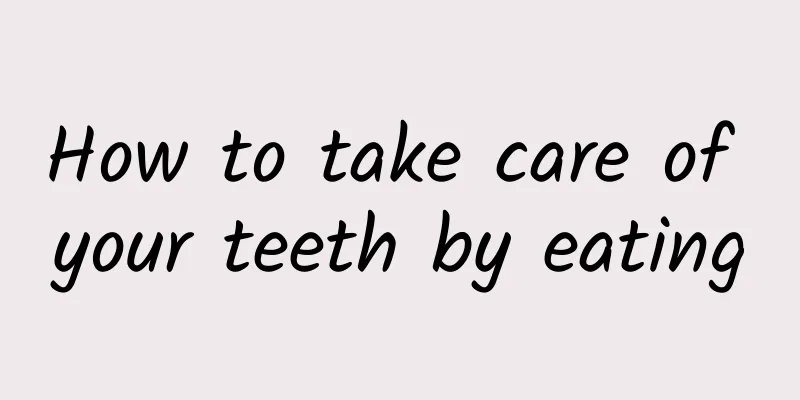How to take care of your teeth by eating

|
Do you have teeth that can eat anything you want, hot, cold, sour, or sweet? Are your teeth, which work hard for us every day and sometimes even have to work overtime, well taken care of? Let's take a look at what to eat to protect your teeth. Celery: A plant-based toothbrush Celery, purple cabbage and other dark green and purple vegetables are the favorite "objects" of teeth. These vegetables contain more dietary fiber, and when chewed, they have a crispy taste. They clean the teeth through friction with the tooth surface, and can be called "plant toothbrushes." Many people tend to throw the celery leaves into the trash when picking celery, but you are throwing away a lot of dietary fiber. Celery leaves contain more dietary fiber than celery stalks. Now let's learn how to make sesame celery leaves that are appetizing and tooth-protecting: chop the blanched celery leaves, sprinkle with sesame seeds, add a small amount of salt, and drizzle with sesame oil, and you will have a unique taste between your lips and teeth. Milk: Fragrant “Mouthwash” 99% of the calcium in the human body is deposited in bones and teeth. It is very important to take in enough calcium every day to maintain a good set of teeth. Milk and dairy products are rich in calcium, which can inhibit the acid production of oral bacteria. The immunoglobulin in milk can also inhibit the growth of bacteria in the mouth, which plays a certain role in maintaining the oral environment and preventing dental plaque. Foreign studies have shown that drinking unsweetened pure milk every day is good for the development of children's teeth. But be sure to make sure it is original pure fresh milk. For us, it is enough to drink about half a pound of milk every day. Seasoning: Tooth Guard Onions, Sichuan peppercorns, and mint may sound a bit irritating, but these supporting ingredients are good for your teeth. The sulfur compounds in onions are powerful antibacterial ingredients that can kill Streptococcus mutans, which causes caries; Sichuan peppercorns have strong antibacterial activity against oral pathogens; and mint can stimulate the secretion of salivary glands, reduce the adhesion of food on teeth, and inhibit the formation of dental plaque. In addition, common onions, ginger, and garlic can also play a certain role in inhibiting the growth of oral bacteria. Don't forget to add some seasonings when cooking, which can both enhance the flavor and protect your teeth. Warm Tips: Teeth hate sucrose, sour foods and carbonated drinks the most. These foods will damage tooth enamel and promote the formation of caries. Therefore, in our daily life, we must rinse our mouths or brush our teeth after eating foods such as candy, cakes, sweet drinks, chocolate, hawthorn, etc. You can rinse your mouth with warm salt water, which can better clean your mouth. |
<<: I gain three pounds every festive season
>>: These 4 methods will make you love whole grains endlessly!
Recommend
The most effective way to deal with dysmenorrhea in girls
It is inevitable for girls to experience menstrua...
Can I eat pork elbow during menstruation?
Meat is a delicacy that all foodies will not give...
What to do when you are 40 years old and in menopause
A woman's life goes through the fetal period,...
How long does it usually take for early pregnancy symptoms to appear?
Pregnancy is a happy thing for the whole family, ...
Stomach congestion in early pregnancy but no vomiting
There are many mothers who are in the early stage...
Girls have big belly like they are pregnant
Because our daily diet is not standardized, we of...
What is breastfeeding pain?
During the breastfeeding period, the breasts beco...
What is gonococcal vaginitis in women
Gonococcal vaginitis in women is an inflammation ...
For nucleic acid testing, you must read these 10 points!
◎ Dai Xiaopei, a reporter from Science and Techno...
Can I get pregnant if I have sex during ovulation and use IVF?
Important reminder: In today's open society, ...
What to eat after IVF transplantation to facilitate implantation
Nowadays, many women are unable to successfully b...
What should I do if I can't get over a premature love breakup? Is it useful to see a psychologist after a breakup?
Find a box and store all the things that trigger ...
How should beginners prepare for rock climbing and how should they practice finger strength?
Rock climbing is a challenging sport that require...
What should I do if a woman is too suspicious?
Everyone has suspicions, which is a very normal p...
4 maintenance methods to balance female endocrine
Endocrine disorders represent an unstable state o...









